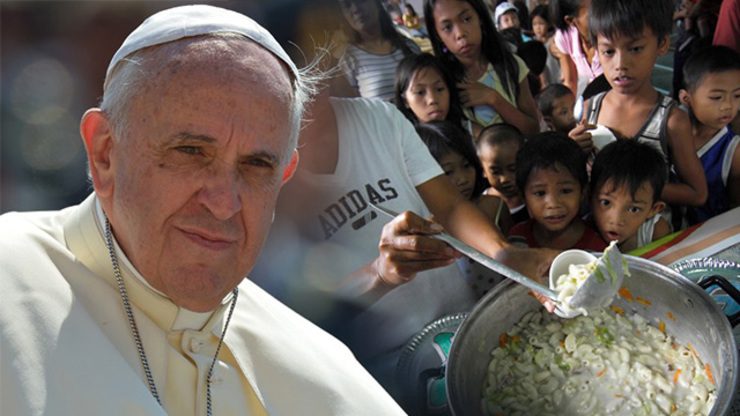SUMMARY
This is AI generated summarization, which may have errors. For context, always refer to the full article.

MANILA, Philippines – For the leader of the world’s largest religious sector, ending world hunger is a top priority.
Pope Francis has demonstrated his firm stance on the problem in several instances since he was placed in the position in March 2013.
Known for his decision to live a simple lifestyle even in his early years as a young priest, the Holy Father does not fall short in reminding everyone that the poor deserves the most attention and help.
In a video message published in October, he challenged the people – especially Catholics – to ensure the end of world hunger by 2025.
“’I was hungry and you gave me something to eat.’ The words of Our Lord call to us today telling us not to turn away and not be indifferent when we know our neighbor is hungry,” he said.
With more than 800 million people suffering from chronic hunger globally, Pope Francis condemns institutions who take part in hindering the flow of resources to those badly in need.
During a United Nations conference on nutrition in November, he lamented how the hungry are given little priority because of the very nature of greed.
“It is also painful to see that the struggle against hunger and malnutrition is hindered by market priorities, the primacy of profit, which have reduced foodstuffs to a commodity like any other,” he said.
End hunger by being a man for others
Like most of the advocates who work to end hunger in the world, the head of the Catholic Church is aware that the problem does not lie in the supply but in the inequality in the distribution of resources.
“The food available in the world is enough to feed everyone,” he said referring to the “paradox of plenty” where not everyone eat the right amount of food despite the world’s bountiful supply.
The paradox can be seen in the fact that Filipino farmers, the country’s primary food producers, are considered to be the poorest and most prone to hunger in the Philippines.
This, Pope Francis said, may have stemmed from the lack of solidarity due to the growing damage done by “mutual suspicion” which leads to “forms of military and economic aggression, undermining friendship between brothers and rejecting or discarding what is already excluded.”
“It is also painful to see that the struggle against hunger and malnutrition is hindered by market priorities, the primacy of profit, which have reduced foodstuffs to a commodity like any other.”
– Pope Francis during the Second International Conference on Nutrition in Rome
Conflict is one of the reasons behind hunger in several countries as it leaves residents in affected areas with no means to support themselves. People are left with no food and other necessities as they are taken away from their sources of livelihood.
In a visit to the Food and Agricultural Organization (FAO) in Rome, which coincided with the Second International Conference on Nutrition, the Holy Father called on the 170 countries present to “to welcome and nurture the values of love, justice, peace” in the spirit of “dialogue and mutual listening.”
An example of how conflict burdened the lives of people is the Zamboanga City conflict between members of the military and the Moro National Liberation Front (MNLF), which led to the destruction of farms and agricultural products.
More than 250 children became malnourished according to a report in November 2013.
Francis hopes that different communities and stakeholders can “hear and consider the expression of the common conscience of humanity” which is to “feed the hungry, save life on the planet.”
Right to food is God-given right
The right to food of every individual is under the protection of the Universal Declaration of Human Rights.
Through this, any state is obligated to follow 3 obligations: to respect, to protect, and to fulfil the right to adequate food of its citizens.
According to the Pope, the right to food is also God-given and therefore, everyone is responsible to help attain not just their own fulfilment but that of others.
He calls on the people to help end hunger by stopping food wastage and respecting the world’s resources.
“Stop thinking that our daily actions do not have an impact on the lives of those who suffer from hunger firsthand,” the Holy Father said in a video message during the launch of the global campaign of prayer and action against hunger.
Filipinos, lovers of everything unlimited especially unlimited rice, will then have to follow the words of Pope Francis. Aside from an inappropriate and homogenous diet which may lead to health complications, the patronage of unlimited rice often results to food wastage up to 308,833 metric tons a year in the country. This could have fed 42 million people.
From January 15 to 19, Francis will be in the Philippines and hopefully, relay his advocacy against hunger to Philippine leaders, local church leaders, and stakeholders who can contribute to the solution.
The Holy Father’s visit to the predominantly Catholic country will then be a ray of hope to Filipinos suffering from poverty and hunger. – Rappler.com
Join Rappler in a 100-day countdown to Pope Francis’ visit to the Philippines: a journey from the Vatican to Tacloban. Tweet us your thoughts using the hashtag #PopeFrancisPH!
Add a comment
How does this make you feel?
There are no comments yet. Add your comment to start the conversation.